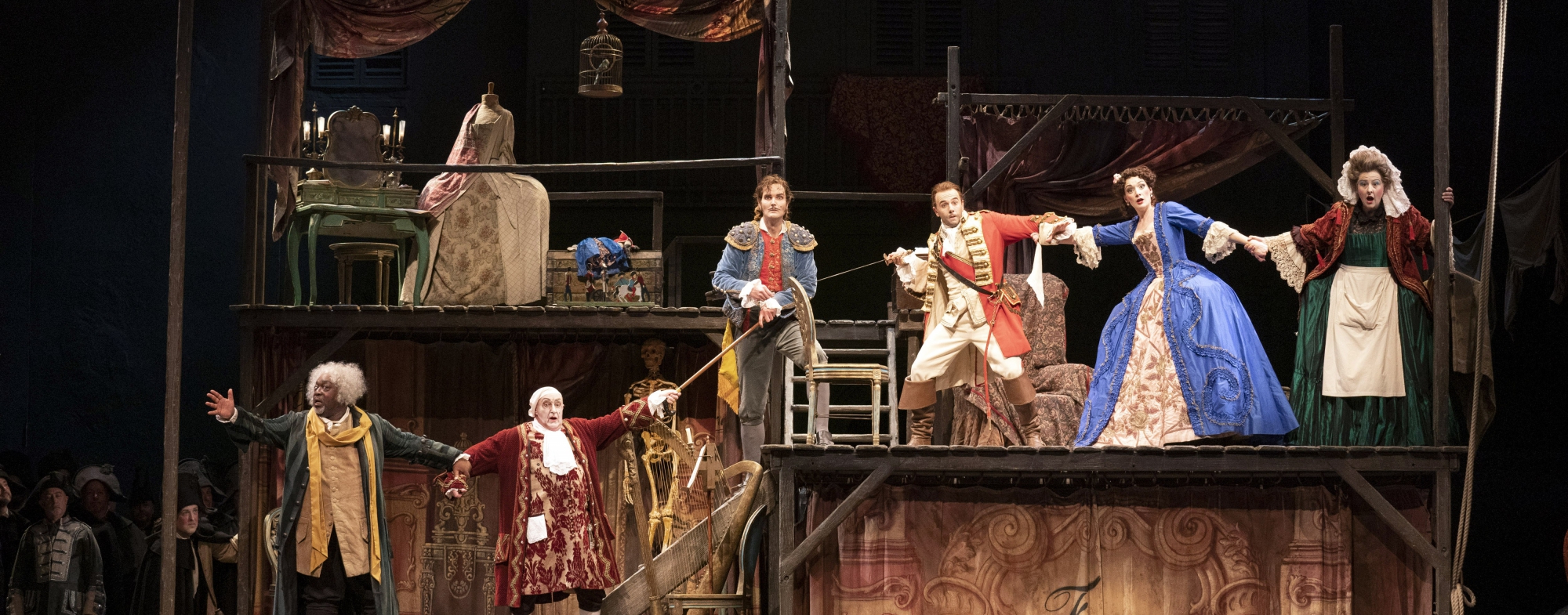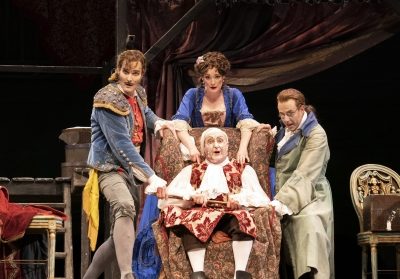Critic David Truslove visited The Mayflower in Southampton to witness Welsh National Opera’s production of Rossini’s The Barber of Seville.
‘This opera … bears the marks of haste, and still more of extravagance; but we are persuaded that all persons who have carried the study of music to the least degree of refinement, must have been delighted and astonished by the occasional touches of genius, the variety and originality of his style’. So, The Times commented in March 1818 regarding the English premiere of Il Barbiere di Siviglia. Just over two hundred years later Rossini’s comedy of class and manners has lost none of its ‘genius’ or ‘variety’. Its slapstick humour, while lost on the critic at London’s King’s Theatre, managed to raise a few laughs at Southampton’s Mayflower Theatre as part of Welsh National Opera’s autumn tour. But this traditional staging – three levels of wooden scaffolding – first aired 35 years ago is now looking decidedly down at heel. It’s a set that could have been designed for the 1818 premiere. Certainly, the costumes might too have come from the King’s Theatre, since neither they, nor the staging, seem to reflect the sparkling vitality of Rossini’s music and the ‘fertility of his invention’. A pity WNO haven’t marked their 75th anniversary season with something more forward-looking.

But this classic farce of two young lovers outwitting the dreams of an elderly guardian aided and abetted by the town’s clever barber remains timeless entertainment. At least, that’s the idea and it begins, under Giles Havergal’s direction, with the chorus arriving on stage in the manner of a travelling company. It’s a play within a play concept where individuals remain throughout and variously cheer, carry pitchers on and off (for no reason I can fathom), and one even plays a wind machine along with the orchestra in the storm scene. Given this Barber is somewhere between artful panto and high-class Gilbert and Sullivan, it nearly comes off, except the gags tickle very few ribs.
If only Russell Craig’s split staging wasn’t so constraining, the multiple levels so needless and the fusty drapes so last season. Everything dulls the eye, even the grinning skeleton, and the excessive furniture limits movement and therefore dramatic expression. That said, we were in no doubt about the quality of the singing especially from Heather Lowe’s mellifluous and conniving Rosina, or the comic timing of Andrew Shore’s Dr. Bartolo. Both impressed within a respectable cast doing their level best with Robert David Macdonald’s English text which caused no small difficulties for the patter arias where slickness of execution was hampered by an unwieldy translation. Nico Darmanin brought plenty of Rossinian ardour to Count Almaviva’s opening Serenade, but this was undermined by much distracting miming of instrumental accompaniment from the chorus when all we needed was voice and guitar – stylishly played here by Daniel Thomas. Nicholas Lester was a well-defined Figaro, more witty than self-important, but his admirably sung ‘Largo al factotum’ never quite projected beyond all the clutter. Things improved with Heather Lowe’s beautifully sung Act One cavatina, ‘Una voce poco fa’, revealing a playful and menacing voice, with fruity low notes and plenty of sparkle up top. Her hand-held puppets added a characterful dimension at once suggesting control and obsession, but something not explored any further in the evening.
Much of the best was served in Act Two, where pace and dramatic tension significantly improved. Ensemble numbers came vividly alive and genuine laughs greeted the unctuous good wishes (‘Peace and Joy’) from Darmanin’s fake Basilio and the bogus music lesson where Andrew Shore’s well-judged interruptions did their best to upstage the young lovers. Keel Watson’s shock of silver hair as the real Basilio made more of an impact than the vocal colouring of his Slander aria, which sounded ill at ease and underpowered. Amongst the cameo roles, Angharad Morgan made an agreeable Berta and Howard Kirk, in the guise of the travelling players’ musical director, brought authority to Fiorello.
From the pit Tomáš Hanus mostly succeeded in conveying Rossini’s playfulness and dramatic incident and coaxed considerable energy and precision from the WNO Chorus. If zesty humour wasn’t always to be found in this production, one could on occasion, vocally at least, detect Welsh Gold shining through.
The Barber of Seville – Photo Credits: Richard Hubert












